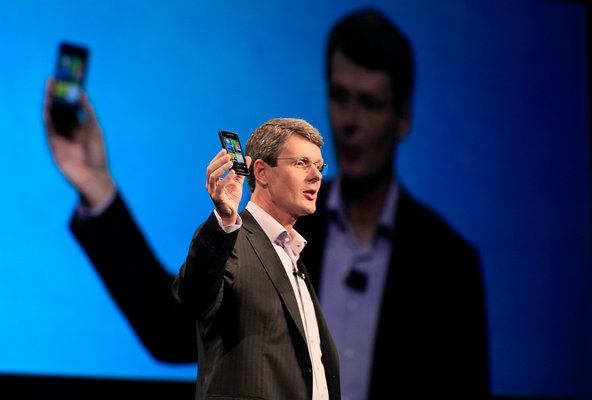 Julie Fletcher/Bloomberg NewsThorsten Heins, president and chief executive of Research in Motion, is under pressure to turn around the company.
Julie Fletcher/Bloomberg NewsThorsten Heins, president and chief executive of Research in Motion, is under pressure to turn around the company.
After rejecting the idea of a sale for months, Research in Motion acknowledged on Tuesday that it was considering “strategic business model alternatives” — or in banker’s speak, RIM, which makes the BlackBerry, said it was pondering a potential deal for all or parts of the company.
But did it wait too long?
A year ago, RIM, a Canadian company, became the subject of takeover rumors, after Google’s $12.5 billion deal for Motorola Mobility. Then, analysts believed that RIM would draw interest from Microsoft, Amazon.com or any number of Chinese phone manufacturers who could afford what would have been a pricey deal.
The company’s executives rebuffed the idea, arguing that RIM was on the verge of a turnaround. New phones were coming that combined touch-screens with BlackBerry’s e-mail and security features. And the PlayBook, with an industrial-strength operating system, could stand toe to toe with the iPad.
But RIM’s prospects have withered since. In March, the company disclosed that its quarterly sales had plunged 20 percent from the previous quarter, as customers migrated to iPhones and Android devices. The company warned on Tuesday that it expected another loss.
The weakness is reflected in the stock’s sharp decline. RIM’s market value is just $5.4 billion, down roughly 76 percent from a year ago. Its share price fell slightly on Thursday, to $10.33.
“Buying this stock is like going to the casino,” analysts at National Bank Financial wrote in a research note on Wednesday.
Now, executives appear to be reluctantly admitting they need to make a change. On Tuesday, the company said that it is conducting a strategic review. As part of its effort, RIM tapped JPMorgan Chase and RBC Capital Markets to help assess its potential options.
Those efforts may not lead to a sale, but instead partnerships with other companies or the licensing of BlackBerry software. Earlier this year, RIM’s chief executive, Thorsten Heins, disavowed any need to consider “drastic change.”
Ehud Gelblum, an analyst at Morgan Stanley, wrote in a note — entitled “No Happy Ending in Sight” — on Wednesday that he did not believe RIM was seeking to sell itself as a whole, but may consider outsourcing its network operating center or selling off parts.
That may be the best option. Earlier this year, the sales prospects for RIM did not look promising. A few analysts believed that RIM did not have “much to offer” a potential buyer.
The company’s prospects may have deteriorated in the intervening months. Some analysts indicate that RIM may only be worth the total value of its patents and its cash, roughly $1.8 billion. It is unclear what the patents may fetch, though analysts at Jefferies estimated last fall that the intellectual property could bring $1 billion to $2.5 billion.
Should RIM put itself on the auction block, it may find the universe of potential buyers remains fairly small. Microsoft, long considered a possible suitor, has been focused on its new Windows operating system and its tie-up with Nokia. Amazon.com has cast its lot with a version of Google’s Android. And buyers in China and India may face complaints from important BlackBerry customers like the United States and Canadian governments.
And patience isn’t necessarily a virtue in deal-making.
Take Yahoo, which Microsoft offered to buy for nearly $45 billion in 2008. The talks quickly cratered, and a deal never panned out. Yahoo has since run through three chief executives and cast about for a new business model.
It has agreed to sell about half of its stake in the Alibaba Group of China, a move that will generate cash that can be paid out to investors. And it has revamped its board.
But it is unclear whether such efforts will make up for Yahoo’s 58 percent drop in value since Microsoft’s takeover attempt.
Then there is Palm Inc., which is often compared with RIM at this stage. Having failed to gain traction with a series of devices built on its own smartphone operating system, the company began a sales process several years ago, drawing in five bids.
One suitor, Hewlett-Packard, was pressured into raising its offer by 20 percent, and ultimately paid $1.2 billion to win the bidding. The deal represented a 23 percent premium to the smartphone maker’s closing price from the day before the offer was announced in 2010. Yet by that point, Palm’s stock price had dropped 50 percent over the previous 12 months.
Still, there’s some hope left for RIM. Motorola Mobility had largely been left for dead by August 2011, trailing Samsung and H.T.C. in the race for Android device dominance. Then Android’s creator, Google itself, arrived with a bid carrying a whopping 63 percent premium, spurred by the valuable patents that Motorola held.
Article source: http://dealbook.nytimes.com/2012/05/31/research-in-motion-struggling-ponders-a-dim-future/?partner=rss&emc=rss

